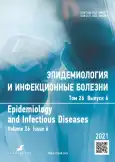Vaccines against new coronavirus infection in Russia and the world
- Authors: Danilov A.N.1, Eremin V.I.1, Filippova N.A.2, Denisova E.G.2
-
Affiliations:
- Saratov State Medical University named after V.I. Razumovsky
- Saratov Regional Clinical Center for AIDS Prevention and Control
- Issue: Vol 26, No 6 (2021)
- Pages: 283-293
- Section: Reviews
- Submitted: 06.04.2022
- Accepted: 25.07.2022
- Published: 23.09.2022
- URL: https://rjeid.com/1560-9529/article/view/106032
- DOI: https://doi.org/10.17816/EID106032
- ID: 106032
Cite item
Abstract
The article is devoted to the review of vaccines against new coronavirus infection in the world and Russia.
Vaccination is an affordable and cost-effective way to reduce morbidity and mortality from COVID-19. The importance of vaccination is beyond doubt and is a method of creating active artificial immunity based on the formed immunological memory to an infectious agent. Conventionally, vaccines can be divided into two groups: classical (recombinant, peptide and virusinactivated), and gene vaccines (vector and mRNA vaccines). Classical vaccines are based on the introduction of ready-made antigens into the body, which can be purified viral proteins, fragments of viral proteins (peptides) or whole inactivated (killed) viral particles. Inactivated whole-virion vaccines contain a weakened or inactivated virus that promotes the development of antiviral immunity. Subunit vaccines contain only surface antigens (specific fragments — subunits), which reduces the amount of protein in the vaccine and thereby reduces its allergenicity. Vector vaccines use safe viruses that are unable to reproduce in the human body (vectors), in which a gene is embedded ― a small section of the coronavirus genome. Vector vaccines effectively cause a cellular and humoral immune response, since the vector, entering the cell, is perceived by the body as a viral infection. Gene vaccines differ significantly from classical ones and produce an immune response at the gene level, since they contain not the virus or protein itself, but the genetic material of the SARS-CoV-2 coronavirus. An RNA-based vaccine delivers a specific set of instructions to the body’s cells for the synthesis of a specific protein, to which the body’s immune system must give an immune response.
The criterion for the effectiveness of the vaccine is the immune response that it creates. The more pronounced and stable it is, the higher the protection against infection. So far, no drugs have been developed that have 100% protection against infection, since the immune response depends on numerous reasons, including individual characteristics of the body, general health, age, etc.
At the present stage, the tasks of vaccination are complicated by such factors of the epidemiological process as the emergence of new highly pathogenic strains of coronavirus.
Keywords
Full Text
About the authors
Alexey N. Danilov
Saratov State Medical University named after V.I. Razumovsky
Email: docvol@yandex.ru
ORCID iD: 0000-0002-9808-8471
SPIN-code: 4501-2565
MD, Dr. Sci. (Med.), Professor
Russian Federation, 69/1 Melnichnaya str., Saratov, 410009Vyacheslav I. Eremin
Saratov State Medical University named after V.I. Razumovsky
Email: epidem2012@yandex.ru
ORCID iD: 0000-0003-4703-0293
SPIN-code: 4871-0785
MD, Cand. Sci. (Med.), Assistant Professor
Russian Federation, 69/1 Melnichnaya str., Saratov, 410009Natalia A. Filippova
Saratov Regional Clinical Center for AIDS Prevention and Control
Email: flp-na@yandex.ru
ORCID iD: 0000-0003-1698-1141
MD
Russian Federation, 69/1 Melnichnaya str., Saratov, 410009Elena G. Denisova
Saratov Regional Clinical Center for AIDS Prevention and Control
Author for correspondence.
Email: elgendenn@mail.ru
ORCID iD: 0000-0002-6628-4099
MD
Russian Federation, 69/1 Melnichnaya str., Saratov, 410009References
- Avdeeva MG, Alekseeva GK, Antonova MV, et al. Infectious diseases: national guidelines. Ed. by N.D. Yushchuk, Yu.Ya. Vengerov. 2nd ed., revised and updated. Moscow: GEOTAR-Media; 2018. 1101 p. (National Guidelines). (In Russ).
- Briko NI, Kagramanyan IN, Nikiforov VV, et al. The COVID-19 pandemic. Measures to combat its spread in the Russian Federation. Epidemiology and Vaccination. 2020;19(2):4–12. (In Russ). doi: 10.31631/2073-3046-2020-l9-2-4-12
- Loo KY, Letchumanan V, Ser HL, et al. COVID-19: Insights into potential vaccines. Microorganisms. 2021;9(3):605. doi: 10.3390/microorganisms9030605
- Nikiforov VV, Suranova TG, Mironov AYu, Zabozlaev FG. New coronavirus infection (COVID-19): etiology, epidemiology, clinic, diagnosis, treatment and prevention. Educational and methodical manual. Moscow; 2020. 48 p. (In Russ).
- Dagan N, Barda N, Kepten E, et al. Covid-19 vaccine with BNT162b2 mRNA in nationwide mass vaccination conditions. J Med. 2021;384(15):1412–1423. (In English). doi: 10.1056 /NEJMoa2101765
- Union of Pediatricians of Russia. COVID-19 News Digest. Pediatric pharmacology. 2020;17(2):152–155. (In Russ).
- Paschenkov MV, Khaitov MR. Immune response against epidemic coronaviruses. Immunology. 2020;41(1):5–19. (In Russ). doi: 10.33029/0206-4952-2020-41-1-5-18
- Prevention, diagnosis and treatment of new coronavirus infection (COVID-19). Temporary methodological recommendations of the Ministry of Health of the Russian Federation. Version 15 (02/22/2022). (In Russ). Available from: https://static-0.minzdrav.gov.ru/system/attachments/attaches/000/059/392/original/%D0%92%D0%9C%D0%A0_COVID-19_V15.pdf. Accessed: 15.04.2022.
Supplementary files






